Home Care Families: Share Your PPE Concerns

DSCC provides dedicated email address for families to submit concerns about personal protective equipment
The University of Illinois at Chicago’s Division of Specialized Care for Children (DSCC) team is working hard to make sure our participants’ needs are met during the COVID-19 pandemic.
For families in the Home Care Program, access to personal protective equipment (PPE) is extremely important for their children with medical complexity.
Nursing agencies are responsible for providing PPE supplies for nurses working in the home.
If you have concerns about the PPE supplies provided for your home nurses, please let us know.
We’ve created a new email address for Home Care families to submit these concerns at DSCCPPEConcerns@uic.edu. Our staff will follow up on any reported issues.
Please continue communicating with your DSCC Care Coordinator to discuss any additional issues you experience. We are here to support your family and will work with you to find solutions and the right resources.
We also encourage you to check our COVID-19 Resource Directory often for the latest health information, education guidance and learning tools, financial assistance and parenting/caregiving support.
What Happens When Caregivers Get Sick? Preparations During COVID-19 and Beyond
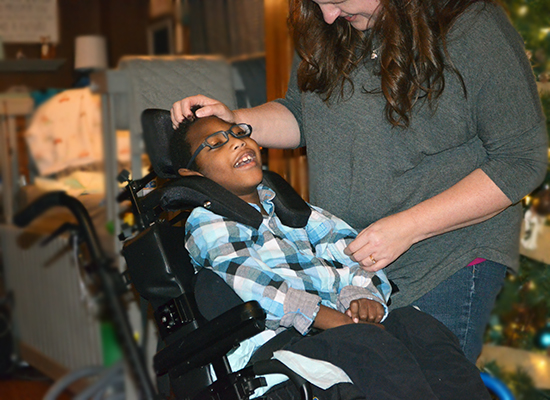
Tips to help parents of children with medical complexity prepare for their own illness and other emergencies
Parents and caregivers of children with medical complexity often focus solely on their child’s health and wellbeing. But what happens when the parent/caregiver gets sick?
It’s a crucial question that families must consider.
“Self-care is overlooked by many parents because they’re so focused on day-to-day care for their child and thinking about what happens if the child becomes ill. Sometimes the daily care of their child can really overshadow parents caring for themselves and making contingency plans if they become ill,” said Dr. Alexandra Ryan, Medical Director for Ann and Robert H. Lurie Children’s Hospital of Chicago’s Health Partners Care Coordination.
“Especially in a climate like this where we have a pandemic, it’s even more important for families to think about what happens if a parent or caregiver is unable to do that daily care.”
Advance preparations can help parents/caregivers reduce stress, lighten their mental load and protect the child’s health and safety during a family illness and other emergencies.
“It’s simply disaster planning and something that all families of children with medical complexity should do on an ongoing basis,” said Dr. Carolyn Foster, Assistant Professor of Pediatrics at Lurie. “For many of these children, they can’t have just any babysitter or relative come over and learn it all in five minutes… The needs are so specific for these children, it requires additional planning.”
Drs. Foster and Ryan spoke with UIC’s Division of Specialized Care for Children (DSCC) about how to start these conversations with your pediatrician during the pandemic and beyond.
Assess your risk
It’s important to learn how to mitigate your family’s risk of contracting COVID-19. Dr. Foster says you can talk with your pediatrician about how to balance this risk with your child’s needs.
“For some children, going to school will be really important because of the way their therapies are set up or what their school’s plans are for in-person learning,” she said.
Lurie has put together a helpful guide, “Return to School for Youth with Special Healthcare Needs: Key Questions and Considerations for Families.”
It includes questions to discuss with your child’s doctor.
Pediatricians can recommend prevention strategies and what works for other families in similar situations.
The next step is preparing for what happens if you do get sick and stay ill for an extended period.
During these conversations, pediatricians may ask about your family’s living situation, including your home’s physical setup and who could isolate with you.
“This information can help with the decision-making and planning, although it’s not something everybody may be comfortable or ready to talk about with their pediatrician,” Dr. Foster said. “In this case, it’s very relevant.”
Have an up-to-date care plan
One of the most important steps for parents of children with medical complexity in general is to make sure your child has an up-to-date care plan.
The care plan should include a description of your child’s major medical issues, a complete medication list, an overview of their daily routine, a list of their healthcare providers and a plan for what happens if your child becomes ill. (The National Resource Center for Patient/Family-Centered Medical Home provides numerous tools, templates and more to help build a care plan.)
You should also keep an inventory of your child’s necessary medical supplies and have a backup supply, when possible, in case you need to quarantine. (DSCC also provides guidance for how to safely clean and reuse home medical supplies.)
“Having that information available makes it easier for whoever needs to take over care for the child in an emergency,” Dr. Foster said. “So, starting to develop the care plan if they don’t have one already is very important.”
Choosing backup caregivers
The care plan should also identify appropriate backup options if you or the primary caregiver cannot care for your child. These options could include family members, friends, a respite or transitional-care facility, or the hospital.
It’s important to consider who is best suited to provide backup care and make sure these individuals are aware and willing to help.
“Something for parents to keep in mind as they are thinking about backup care is trust. It’s more important that parents trust this person with the medical care and that the child can also develop trust in this person, whether it’s your closest family member or not,” Dr. Ryan said. “It’s more important to think about the characteristics of the person and how much trust you have in that person’s ability to do the tasks for the child, rather than the relationship.”
Dr. Foster recommends letting the backup caregiver spend time with your child and practice administering medication, watch how to safely transfer them and so on.
“It reduces the stress for the person who has to step in so it’s not all new to them,” she said.
If a family member or friend is not available, Drs. Foster and Ryan suggest looking to your family’s faith or school community. You should also let your pediatrician know if you’re struggling to identify backup care.
Preparing for hospitalization
Depending on their medical complexity, some children may require hospitalization if their parent/caregiver becomes ill. Discuss this possibility with your pediatrician and identify your hospital preference and transportation needs.
Dr. Foster said pediatricians can help you find the least restrictive option available for your child, such as a long-term care or respite facility.
If hospitalization or a facility stay is necessary, write down any “need to knows” about your child and keep them with their care plan and medication list.
Dr. Ryan said it’s helpful to include information about your child’s baseline development and behavior, such as how they typically communicate, how your child looks when healthy, etc.
“So often if somebody is hospitalized, especially patients with mental disabilities or medical complexity, the patient team may not know what the child looks like when they’re healthy. If you don’t know the child, it can be really hard to tell if they’re sick,” Dr. Ryan said. “Making sure that’s something that’s communicated to everyone taking care of the child is really important.”
Dr. Foster said it’s also good to have a list of important phone numbers at the ready. These contacts should include any specific transportation needed to get your child to the hospital.
“If there are any specific transportation arrangements that the caregiver should know about, that should be part of the care plan,” she said.
Home nursing
Some children with medically complexity who have nursing in the home setting may be able to continue to stay at home but with extra nursing care, if the child’s primary caregiver is ill or incapacitated.
Illinois’ Medicaid Program has worked to ensure additional respite hours are available for children who receive services from a Medicaid waiver.
Let your nursing agency know in advance if you prefer this option for your child.
Plan for future guardianship needs
Parents/caregivers should always make sure they have a will in place. A will ensures your future guardianship needs and other important decisions are planned for accordingly.
“We all know, especially in today’s world, how quickly things can change, so it’s really important to put planning a will more on the front burner for any family, but especially if you have a child with medical complexity who is going to require specialized care,” Dr. Ryan said.
“If a family has gone through the mental exercise of figuring out who they trust and who they’d like to take care of their child in case they get sick, then who they’d like to care for their child in the long-term if something happens to them may be the same person,” she added. “It may not be someone who guardianship automatically goes to, so that’s why it’s so important to have something in writing going forward.”
Lurie and DSCC staff recommend the following resources:
- Greenlight Family Services – Formally known as the Center for Law and Social Work, Greenlight helps families all over Illinois with adult guardianship cases and can also counsel families on backup arrangements as well.
- Lurie’s Understanding Guardianship Tip Sheet – Available in English and Spanish
- Illinois Guardianship and Advocacy Commission
- The Guide to Special Needs Planning – Information on special needs trusts from the Academy of Special Needs Planners
- The Family Caregiver Alliance – Provides fact sheets on legal topics, including conservatorship and guardianship
- Family Voices resource e-blast – Includes tips for what to do if the caregiver gets sick/can’t care for their child
- Illinois Attorney General’s Office – Provides legal assistance referral information
- The National Hospice and Palliative Care Organization – Information on advance directives in Illinois
- The Conversation Project – Provides conversation starter kits to help families plan for their wishes regarding end-of-life care
Prioritize planning
Though these steps and conversations may require some additional effort, Drs. Foster and Ryan say they are well worth the time and peace of mind.
“I think there’s a lot of invisible stress that parents may not even realize they have on their mind,” Dr. Ryan said. “You can really tackle it by having a plan in case the worst happens. People will see a lightening of that mental load once they have a plan in place.”
Dr. Foster also notes that there is no one-size-fits-all approach to contingency planning.
“Like any family decision, yours might be slightly different than others,” she said. “It’s very individualized. I’ve heard parents worry about judgment or this is what others are doing, but it’s a personalized decision based on a family’s unique situation.”
Important Updates for Home Care Families
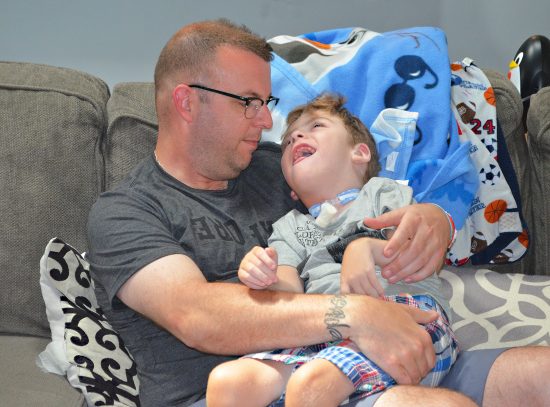
DSCC is partnering with HFS to focus on families’ concerns and find solutions to pandemic-related challenges.
The University of Illinois at Chicago’s Division of Specialized Care for Children (DSCC) takes pride in our partnership with the participants and families we serve.
Some Home Care parent partners have let us know about recent concerns affecting their children and families. We are working with the Department of Healthcare and Family Services (HFS) to address these concerns.
DSCC’s leadership would like to share the following updates with our Home Care families:
School in the fall
This school year will likely be a very different experience for our participants. With the first day fast approaching, we want you to know that DSCC and HFS are partnering to discuss ways to ensure your family is supported.
The decisions for how schools will operate this fall is up to individual school districts across the state.
We know many schools have yet to comprehensively address how they will handle services for children with individualized education programs (IEPs). Please communicate closely with your school district.
Also, let your DSCC Care Coordinator know if there are ways we can help support you and your child. Our staff can attend school meetings and work with your child’s IEP team to make sure their needs are met.
In a recent notice from HFS, the agency states it will ensure your child receives adequate nursing hours if the way nursing hours are provided in the school setting changes. Some individuals already have this difference written into their 2352. DSCC is working to get this information to HFS for changes to be made.
If your child’s difference in nursing hours from school is not clearly stated in your 2352 allocation, please notify your Care Coordinator so we can work to have HFS review your needs further.
DSCC encourages you to discuss any concerns about your child’s school-related needs with your pediatrician. Your child’s medical team can help weigh the pros and cons of in-person versus remote learning, if applicable.
Personal Protective Equipment (PPE)
Nursing agencies are responsible for providing PPE supplies for nurses working in your home, as always.
With the COVID-19 pandemic creating an increased demand for PPE, HFS has approved an additional $16 per day payment to nursing agencies on the days a nurse is working in the home. The nursing agencies across the state have received guidance on how to bill for this additional payment (a fairly simple process).
DSCC has been communicating regularly with home nursing agencies about the availability of PPE supplies. To date, availability has not been a problem. If you have concerns about the PPE supplies provided for your home nurses, please let DSCC know.
Your Home Medical Equipment company handles providing PPE supplies for your family. You will need an order from your child’s provider for these supplies.
Reminders
HFS received approval for several additional elements to be provided for your child, as needed, as part of Appendix K. Appendix K is an emergency coverage document for individuals receiving services through a Medicaid waiver. Please see a copy of the approved Appendix K document.
A few elements included are:
- Approval of nurse overtime for nurses working in the home setting at a rate of time and a half (for medically fragile, technology-dependent (MFTD) waiver participants only)
- Parents who are licensed nurses may be paid caregivers (for MFTD waiver participants and Nursing and Personal Care Services (NPCS) non-waiver participants)
- Respite hours are increased to 672 per year with respite provided at an increased rate (for MFTD waiver participants only)
Our DSCC team is here to support our Home Care participants and families. We will continue to work closely with HFS to focus on your concerns and find solutions.
We are all facing new challenges as a result of the COVID-19 pandemic. Please continue to communicate with your DSCC Care Coordinator or feel free to contact our administrative team to discuss any additional concerns you may have.
Updated Council Seeks Parent Input
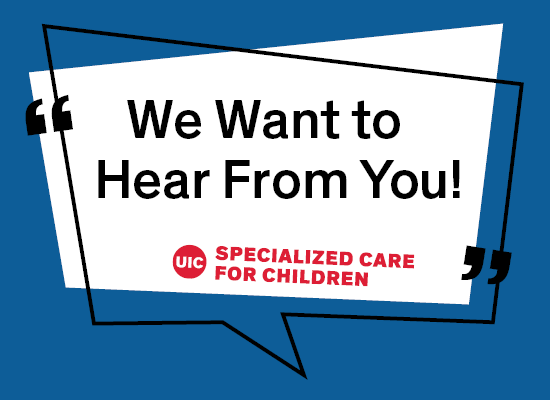
DSCC’s updated Family Advisory Council makes it easier for families to take part and share feedback.
Feedback from our parents and participants is important to us at the University of Illinois at Chicago’s Division of Specialized Care for Children (DSCC).
We have updated our Family Advisory Council (FAC) setup to make it easier for families to take part and share their input.
The FAC’s mission is to bring together families and our staff and leadership to promote the delivery of participant and family-centered services.
Our updated council will connect families to resources and provide guidance to strengthen our teamwork, improve communication and empower families to have a voice in their child’s care.
Our Family Advisory Council will consist of 15 family members and two DSCC staff members. Members must agree to a one-year commitment with an option to stay for a second.
The FAC will meet in person twice per year. Meeting locations will include Springfield, Chicago and southern Illinois.
We plan to hold a virtual meeting in September 2020. We will hold two more virtual meetings per calendar year via telephone or video.
FAC members will receive $100 per face-to-face meeting with travel reimbursement, lodging fees and per diem included. Members will receive $50 per virtual meeting.
Family engagement is essential for a successful Family Advisory Council. FAC members will have a shared responsibility to facilitate meetings and keep participant- and family-centered values at the forefront of discussions.
We ask that FAC members not only attend scheduled meetings but also share ideas, provide feedback and give support to other members. These are crucial components for a strong and productive committee.
Eligible FAC members must:
- Be a family member of a current or former Core or Home Care program participant
- Have knowledge of and interest in improving systems of care for children with special healthcare needs
- Have time for quarterly meetings
- Can travel to the regional hub for face-to-face meetings
Please contact Adell Scott (adells@uic.edu) or Claire Richardson (clairer3@uic.edu) if you have any questions or recommendations. You may also reach them by phone at (217) 558-2350.
COVID-19 Memory Book Activity for Families

DSCC provides memory booklet for children and families to complete together during the pandemic.
From school closings to parents suddenly working from home, the coronavirus (COVID-19) pandemic has drastically changed Illinois families’ way of life over the last two months.
To help children express themselves and record their experiences during the Stay at Home Order, we’ve created our own COVID-19 Memory Book that families can print out and complete.
The book includes an “About Me” section for children and youth to fill out as well as their favorite ways to stay busy, what they are thankful for, how they’ve stayed connected with others and a list of celebrations that happened during social distancing. There’s also a page for children to fill out if they celebrated a birthday during the pandemic.
The back page includes information about the COVID-19 resources compiled by the Univesity of Illinois at Chicago’s Division of Specialized Care for Children (DSCC). The resources include links to more at-home learning opportunities and activity resources for families.
Click on the COVID-19 Memory Book link to print the PDF.
The book is also available in Spanish.
DSCC Family Brings Apraxia Awareness to Central Illinois

Mandy Nicolaides is raising awareness about her son’s severe speech and communication disorder.
Mandy Nicolaides thought her son may never speak.
At 3 years old, he could say less than five intelligible words, she recalled.
Eldon knew what he wanted to say. The message from his brain wasn’t connecting with his mouth muscles to make the right sounds.
Eldon was diagnosed with childhood apraxia of speech. It’s a
motor speech disorder that makes it difficult for a child to plan the right
mouth movements for speech.
With the right speech therapy, Eldon has flourished and is
now able to speak full sentences at 4 years old.
Apraxia is one of the most severe childhood speech and communication disorders. Yet, it is often misunderstood or unfamiliar to the general public. Mandy is now working to raise awareness and share Eldon’s story.

Mandy petitioned the city councils in Bloomington and Normal to declare May 14 Apraxia Awareness Day in their communities. McLean County will also make a proclamation for Apraxia Awareness Month in May. May is also Better Hearing and Speech Month.
Mandy believes it’s important to be a strong advocate for
her child and educate the community about Eldon’s condition.
“It’s frustrating because a lot of people look at him and
think he doesn’t know what he’s saying,” she said. “His receptive language is
insane. His speech just sometimes comes out as gibberish, but he thinks he’s
saying it perfectly clear.”
Eldon was born with severe hearing loss in his right ear and
now has a cochlear implant.
He began receiving Early Intervention services shortly after
birth. He later enrolled with the University of Illinois at Chicago’s Division
of Specialized Care for Children (DSCC).
As he grew, Eldon struggled to speak. Mandy at first thought he had a developmental delay.
One of his Early Intervention therapists diagnosed him with
childhood apraxia of speech around his 3rd birthday.
Mandy then enrolled Eldon in the Carle Auditory Oral School
(CAOS) in Urbana. The program helps children with and without hearing loss
develop spoken language and listening, thinking and learning skills.
At CAOS, Eldon receives extensive speech therapy with speech
pathologists well-versed in apraxia, Mandy said.
Since the family lives in Bloomington, Mandy drives an hour each way to take Eldon to school. She says the commute is well worth it.
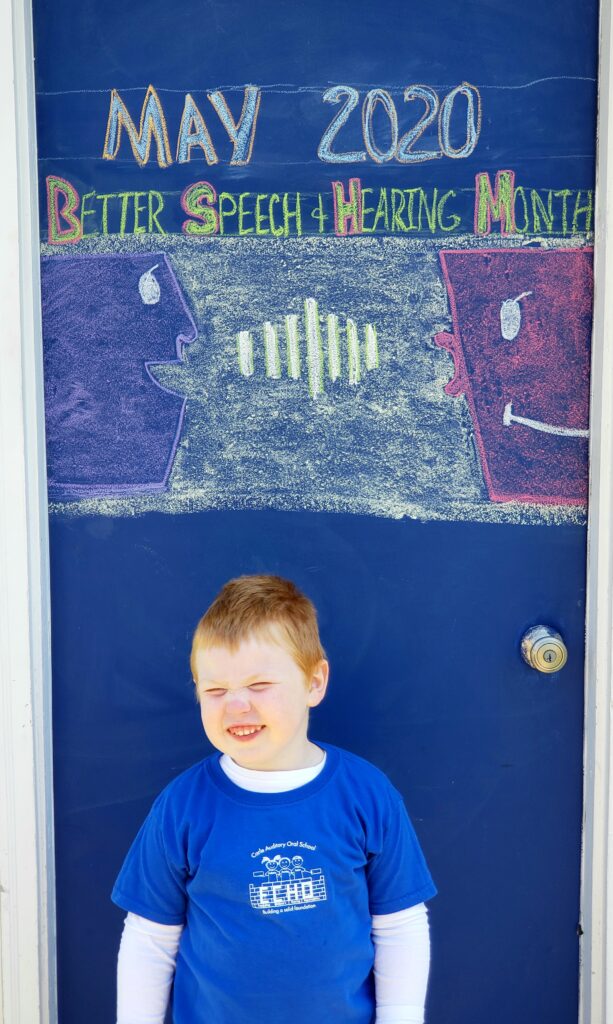
“It’s amazing. I cannot say enough good things about what this school does for these kids. If they were not there, I know without a doubt Eldon would not be where he is,” she said “Every child with apraxia is different. They might struggle with different sounds or words, so his school is tailored to each child and their needs.”
Speech therapy is vital for youth with childhood apraxia of
speech.
“The biggest thing is being able to diagnosis it properly.
Kids can be so different on what they struggle with,” Mandy said. “With Eldon,
it’s a double-whammy. He has the apraxia and he has the hearing loss, which
makes it difficult to pinpoint sounds.”
Mandy is thankful for the support from the CAOS program,
Early Intervention and DSCC to help Eldon receive the right therapy and
services for his unique needs.
“Early intervention gave me so much insight and answers to
so many questions and helped guide me in the right way,” she said.
Mandy calls her DSCC Care Coordinator, who is a
speech-language pathologist, phenomenal. She attends Eldon’s appointment
and takes notes for Mandy. She also helps the family find resources and stay on
track with important deadlines.
“It’s definitely been an emotional journey and an exciting
and scary journey,” Mandy. “I remember people telling me at the beginning of
this to document everything… It’s hard sometimes when there isn’t a lot of
progress or times when we’re stagnant. But then I look back and remember where
he was and that all of these little accomplishments are huge for him.”
For more information on apraxia, visit www.apraxia-kids.org.
More information on Eldon’s progress and the family’s fundraising efforts for the Carle Auditory Oral School is available on their fundraising page.
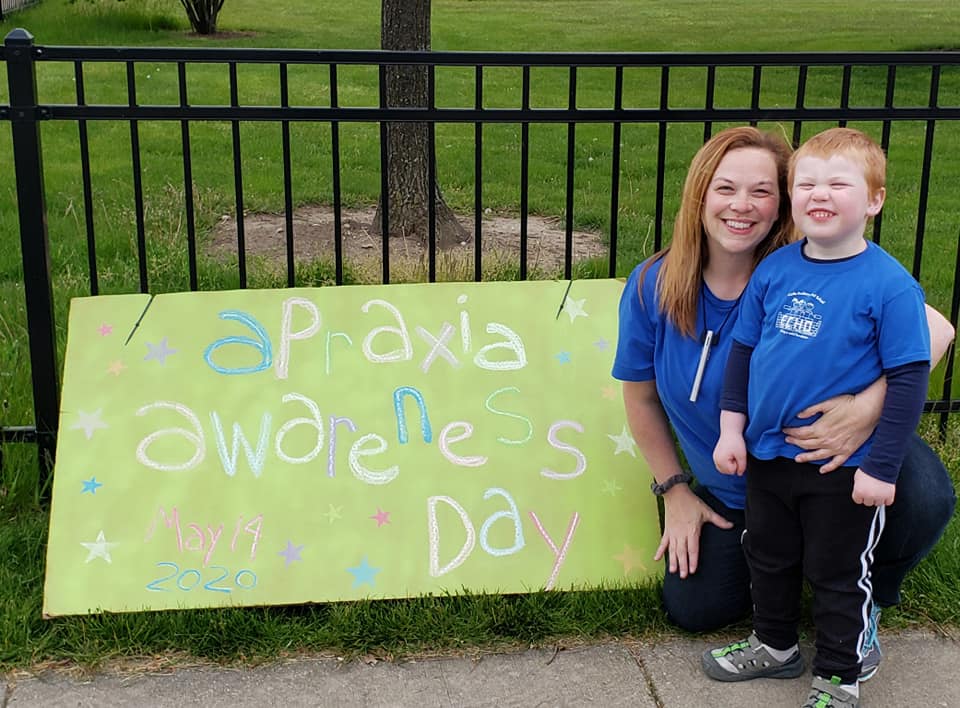
DSCC Phone Number Reminder for Participants

DSCC’s posted office phone numbers are best way to reach our staff by phone.
Our staff is here to help Illinois families navigate the far-reaching effects of the coronavirus (COVID-19) pandemic.
We want to make sure Division of Specialized Care for Children (DSCC) participants use the correct phone number when calling their Care Coordinator or other DSCC team member.
Participants and community partners should use the local number or toll-free 800-number for each regional office posted at https://dscc.uic.edu/find-an-office/.
Our office numbers are also listed on our brochure and in our Family Handbook for participants.
You may also call our general toll-free number at (800) 322-3722 and we’ll direct you to the right place.
We have updated our phone system. Our main office numbers remain unchanged, but previous internal phone numbers will be disconnected.
Please only use our listed office phone numbers going forward.
Thank you for your cooperation!
2020 Parent Institute Canceled
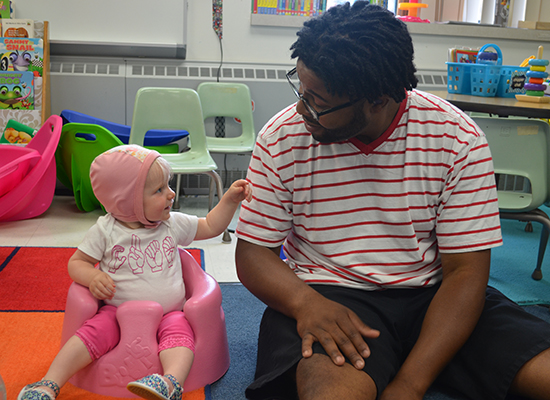
The Institute for Parents of Preschool Children Who are Deaf or Hard of Hearing is canceled due to the COVID-19 pandemic.
We are sorry to announce that this year’s Institute for Parents of Preschool Children Who are Deaf or Hard of Hearing is canceled.
This decision follows the Governor’s executive orders to keep schools closed, keep people home, maintain social distancing and promote public health during the coronavirus (COVID-19) pandemic.
The Institute is a one-week program for parents of children ages 5 and under who have a significant hearing loss. It takes place on the campus of the Illinois School for the Deaf in Jacksonville each June.
Participating parents attend daily lectures by experts in the field to learn about raising a child with hearing loss.
Although we cannot gather in person, parents can still access presentations from the Institute’s experts.
As a supporter of the Institute, the University of Illinois at Chicago’s Division of Specialized Care for Children (DSCC) has made these presentations available online so they can benefit more families of children with hearing loss.
Videos on each topic are posted on the Illinois Sound Beginnings website.
Parents and caregivers can watch each presentation at their own pace in the comfort of their own home.
We will announce details for next year’s Institute after organizers determine a date.
If you would like more information about the Institute, call us at (800) 322-3722 or email Institute@exchange.dscc.uic.edu.
DSCC Family Spreads Easter Joy to Hospitalized Children
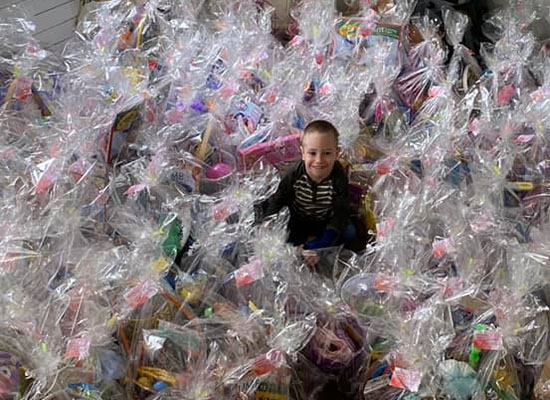
The Johnson family donated 160 Easter baskets for children at Central DuPage Hospital, surpassing their goal despite the coronavirus outbreak
Andrea Stambaugh vividly recalls the disappointment she felt
when her son, Axel Johnson, was in the pediatric intensive care unit on Easter
weekend 2018.
There would be no coloring eggs, Easter egg hunts, or other
favorite family celebrations.
“I was feeling like a failure because I didn’t have an Easter basket beautifully wrapped and thoughtfully hidden here for Axel to see on Easter morning,” Andrea wrote on her Facebook page, “Axel’s Journey with CMV.” “Then, as the lights turned down in the hallway and it grew quiet, I heard a family in the hallway praying. Praying not for Easter baskets and a chance to color eggs, but for life.”
The moment immediately changed her perspective. Andrea vowed to offer love and support to such families who can’t be home making memories with their children.

For the last two years, the Johnsons have collected donations to fill Easter baskets for hospitalized children. Despite unexpected challenges from the coronavirus outbreak, the family surpassed this year’s goal and delivered 160 Easter baskets to Central DuPage Hospital in Winfield.
“We know the burden and the mom guilt that people feel when they can’t provide their kid a proper holiday. We know that that’s a lot of stress and a lot of burden and frankly, the families are dealing with a lot of other things if they’re in the hospital,” Andrea said. “They shouldn’t have to feel that pressure, so we’re here to make sure that’s relieved from them and that they can focus on healing for their child.”
Axel is 3 years old and a participant in the University of Illinois at Chicago’s Division of Specialized Care for Children program.
After his Easter hospitalization, Andrea researched information
from other organizations who coordinate Easter basket donations. She put
together a list of suggested items, including coloring books, puzzles, dolls
and action figures. She then asked her page followers for donations.
The Johnsons hoped to collect enough items for 25 baskets for Easter 2019. Donations far exceeded this goal. A team of volunteers helped them put together a total of 125 baskets for children at multiple Chicago-area hospitals.
This year, the Johnsons aimed to donate 150 baskets. They
set up an Amazon wish list for Easter basket items, and donations started to
pour in. But challenges soon arose as the coronavirus outbreak escalated. For
safety reasons, two hospitals could no longer accept donations for patients.
Central DuPage Hospital could accept the baskets if the
Johnsons followed strict safety precautions.
“We have an immunocompromised child, so we know about the
importance of keeping the children and the families safe during this time,”
Andrea said.
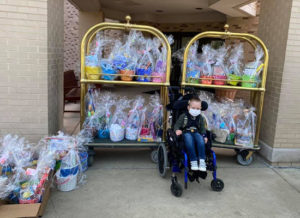
Every Easter basket item was purchased new and cleaned with bleach spray or a sanitizing wipe. Andrea and her partner, Adam Johnson, wore gloves and masks while sorting the items and wrapping the baskets with cellophane and personalized notes.
Due to the pandemic’s social distancing requirements, Andrea
and Adam spent 16 hours packaging 160 baskets without their usual team of
volunteers.
Last weekend, they delivered the baskets to Central DuPage
Hospital in Winfield to be ready for patients on Easter Sunday.
“It makes our hearts really happy every year when we get to
see the finished product and all of the kids that will be blessed this Easter,”
Andrea said.
The family is also already planning to provide baskets to
more hospitals next Easter.
For more information about their project and Axel’s condition, visit “Axel’s Journey with CMV” on Facebook.
Home Medical Supply Guidance for Families During COVID-19 Outbreak
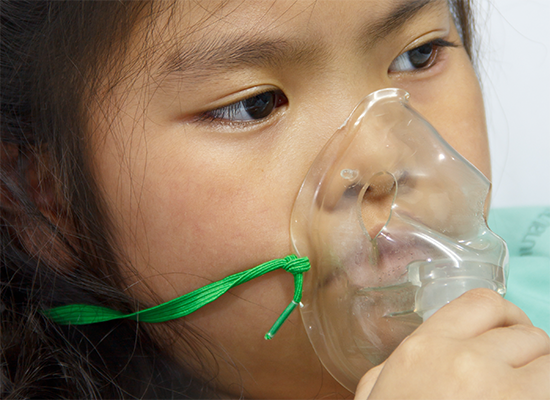
Instructions for safely cleaning and re-using supplies for technology-dependent children.
Adequate
medical supplies are essential for families caring for children who are
medically fragile and technology-dependent at home.
The
University of Illinois at Chicago’s Division of Specialized Care for Children
(DSCC) wants to make sure our participant families can keep their supplies
properly stocked through the coronavirus disease 2019 (COVID-19) outbreak.
We’ve compiled guidance and instructions to help families safely clean and re-use supplies in case there’s a future shortage. *Please note you should check with your child’s care team to make sure these guidelines are appropriate for your child.
The DSCC Guidance on Home Medical Supplies includes instructions for cleaning and re-using:
- Feeding supplies
- Suction supplies
- Tracheostomy supplies
- Ventilator equipment
- Nebulizer equipment
*Again, please check with your child’s care team to make sure these guidelines are appropriate for your child.
The guidance is available on our Home Care Information and Resources page as well as in our list of COVID-19 resources and supports for families.
Our
Care Coordinators are also available to discuss strategies and help you become prepared
and well-equipped for your child’s care in the weeks and months ahead.
Please
reach out to your local regional office or call us at (800)
322-3722.



